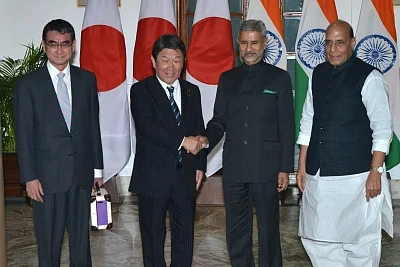By Sumit Kumar Singh
New Delhi, Nov 30 (IANS) India and Japan have expressed concerns over threat posed to regional security by terrorist networks operating out of Pakistan and called upon Islamabad to take resolute and irreversible action against them and fully comply with international commitments, including the Financial Action Task Force (FATF).
During first foreign and defence ministerial dialogue (2+2), here on Saturday, the lawmakers of both the countries "emphasised the need for stronger international partnership in countering terrorism and violent extremism, including through increased sharing of information and intelligence".
They also condemned North Korea's recent launch of ballistic missiles, which are in clear violation of the relevant UN Security Council resolutions (UNSCRs).
Defence Minister Rajnath Singh and External Affairs Minister Jaishankar held talks with Japan Minister of Defence Kono Taro and Foreign Affairs Minister Motegi Toshimitsu and also decided to hold next round of 2+2 in Tokyo.
They announced that they were close to conclude the Acquisition and Cross-Servicing Agreement (ACSA) negotiations, which would boost defence and security ties. The ACSA negotiations started in October 2018.
The deliberations, they affirmed, would enhance the strategic depth of bilateral security and defence cooperation. Acknowledging emerging security challenges, they reiterated commitment to advancing bilateral security cooperation based on the 2008 joint declaration on security cooperation and the 2009 action plan to advance security cooperation.
Recalling that the two sides had a shared vision of a free, open, inclusive and rules-based Indo-Pacific region in which the principles of sovereignty and territorial integrity were ensured, and all countries enjoy freedom of navigation and overflight, they emphasised that "further strengthening of bilateral cooperation was in mutual interest and would also help in furthering the cause of peace, security and prosperity in the region."
The leaders expressed satisfaction over bilateral exercises between three Services of their defence forces and decided to make efforts for holding regularly bilateral exercises between the defence forces, and further expanding it.
They also cited joint exercise of the second Dharma Guardian-2019 and the second Shinyuu Maitri-2019 and concurred to proceed with coordination for the first India-Japan joint fighter aircraft exercise in Japan.
Acknowledging the importance of ensuring maritime safety in achieving a free, open, inclusive and rules-based Indo-Pacific region, they expressed their intention to further promote cooperation in the field of capacity-building in maritime security and maritime domain awareness, including through cooperation with other countries.
In this context, the Ministers appreciated setting up of Information Fusion Centre - Indian Ocean Region (IFC-IOR) by India in December 2018. Indian lawmakers looked forward to Japanese side dispatching a liaison officer at the IFC-IOR in the near future.
They noted with satisfaction the start of exchange of information based on the Implementing Arrangement for Deeper Cooperation between the Japan Maritime Self-Defence Force and the Indian Navy signed last year.
The leader also emphasised the need to strengthen the defence equipment and technology cooperation and looked forward to productive discussions in the fifth Joint Working Group on Defence Equipment and Technology Cooperation (JWG-DETC). They appreciated the progress on cooperative research in the area of Unmanned Ground Vehicle or Robotics.
They had a "frank and fruitful exchange of views on the regional issues of mutual interests, particularly on the security situation in the Indo-Pacific".
Japan appreciated India's announcement of "Indo-Pacific Oceans Initiative" at the recent 14th East Asia Summit to create a safe, secure, stable, prosperous and sustainable maritime domain and confirmed their willingness to discuss concrete cooperation based on it.
They noted that India and Japan's initiatives for realising a free and open Indo-Pacific, including also the recent "Indo-Pacific Oceans Initiative" and AOIP all strive for an Indo-Pacific region that is inclusive and open to all countries in the region. The Indian side welcomed Japan's "Vientiane Vision 2.0" this month as an updated initiative for defence cooperation between Japan and ASEAN.
They also reaffirmed the importance of realising North Korea's complete, verifiable and irreversible dismantlement of all weapons of mass destruction and ballistic missiles of all ranges in accordance with the relevant UNSCRs and expressed commitment to their full implementation.
The lawmakers urged North Korea to resolve the abductions issue at the earliest date.
They also talked about recent developments in the South China Sea keeping in view also the Chairman's Statement of the 14th EAS and reaffirmed the importance of freedom of navigation and overflight, unimpeded lawful commerce and peaceful resolution of disputes with full respect for legal and diplomatic processes in accordance with the universally recognised principles of international law, including those reflected in the United Nations Convention on the Law of the Sea (UNCLOS).
They took note of the negotiations for a Code of Conduct (COC) and said it should be effective, substantive and consistent with international law, including the UNCLOS, ensure freedom of navigation and must not prejudice the rights and interests of the stakeholders using the South China Sea and freedoms of all states under international law.
(Sumit Kumar Singh can be reached at sumit.k@ians.in)
--IANS
sk/pcj
(At The Quint, we question everything. Play an active role in shaping our journalism by becoming a member today.)
